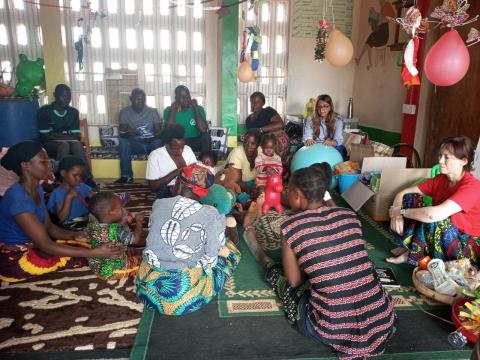Early learning environments for children aged 3–6, even in the most resource-limited settings.

By Viktorya Sargsyan, Senior Technical Advisor, Early childhood Development and Charbel Chidiac, Senior Education in Emergencies Advisor for World Vision International
In Cox’s Bazar, Bangladesh, Rohingya children engage in story circles, water play, and art using local materials. These activities are not only educational but also serve as therapeutic interventions, helping children process trauma and rebuild emotional connections amidst ongoing displacement and instability. Psycho Social Support (PSS) for teachers and parents is integral, equipping them with the skills to foster safe, nurturing environments while managing their own stress and trauma. Children with disabilities are particularly vulnerable in crisis settings, requiring adaptive approaches that ensure they have equal access to safe, inclusive play and learning activities. We train and mentor local facilitators, most of them women from the same communities, to bring empathy, structure, and creativity to their teaching, turning chaotic displacement into a chance for structured, meaningful play that fosters a sense of stability in a context where uncertainty prevails. Integrating education, protection, and health sectors ensures a holistic response, addressing not only learning needs but also safety and well-being.
Dignity for Those Who Deliver
None of this is possible without the dedication of the early childhood workforce. Too often, these teachers, facilitators, and home visitors are underpaid, undertrained, and undervalued—especially in humanitarian settings, where the demand for such roles only increases as crises persist. World Vision is committed to upholding their dignity and rights, offering training, ongoing coaching, and professional development opportunities that not only build skills but also create pathways for livelihood and leadership, ensuring the sustainability of these vital programmes even in protracted crises. Anticipatory actions, such as preparedness training and early intervention frameworks, are essential to mitigate the impact of emerging crises. In South Sudan, women who once fled with their own children now serve as Go Baby Go facilitators, earning stipends, accessing trauma-informed coaching, and becoming trusted role models in their communities. In Lebanon, Syrian refugee teachers in Learning Roots - supported centres have gone on to receive national ECE certification—a powerful example of how investing in the workforce uplifts entire communities, transforming adversity into opportunity.
A Continuum of Care: Relationships That Heal
Whether in the home, the classroom, or the camp, healing begins with connection. Our models reinforce a continuum of nurturing relationships—from caregiver to child, from facilitator to caregiver, and from mentor to facilitator. These human connections are the scaffolding that holds children’s emotional and cognitive development in place, especially when everything else is uncertain. By integrating trauma-informed approaches into every layer of our programming, we create a protective network that helps children regain trust and hope, laying the foundation for both learning and healing, an imperative in contexts where the uncertainty of crisis and displacement can undermine even the most basic sense of security. Disaster Risk Reduction (DRR) strategies further enhance these protective networks by preparing children, families, and facilitators to respond to future crises, ensuring that learning and safety continue even in the face of adversity.
One Shared Hope
Across our Early Childhood Development (ECD) programmes, World Vision is reaching over 589,807 children under six in 34 Field Offices and supporting more than 44,194 ECD caregivers in 14 Field Offices and 12,144 ECE practitioners in 16 Field Offices (these include ECD Teachers, ECE Committee Members and Go Baby Go Facilitators/Practitioners). These aren’t just numbers—they are futures being rewritten through the power of play, the promise of protection, and the dignity of being seen and supported. Every number represents a child whose developmental journey has been disrupted by crisis. In contexts where formal education systems are fractured, early childhood education becomes a critical intervention that can mitigate the long-term impacts of conflict and displacement. Our programmes not only provide play-based learning but also serve as protective spaces where children can reclaim their right to learn, grow, and dream, even amid protracted emergencies. With the right support, play becomes a powerful act of survival—and a declaration of hope.
Recommended Links to view: